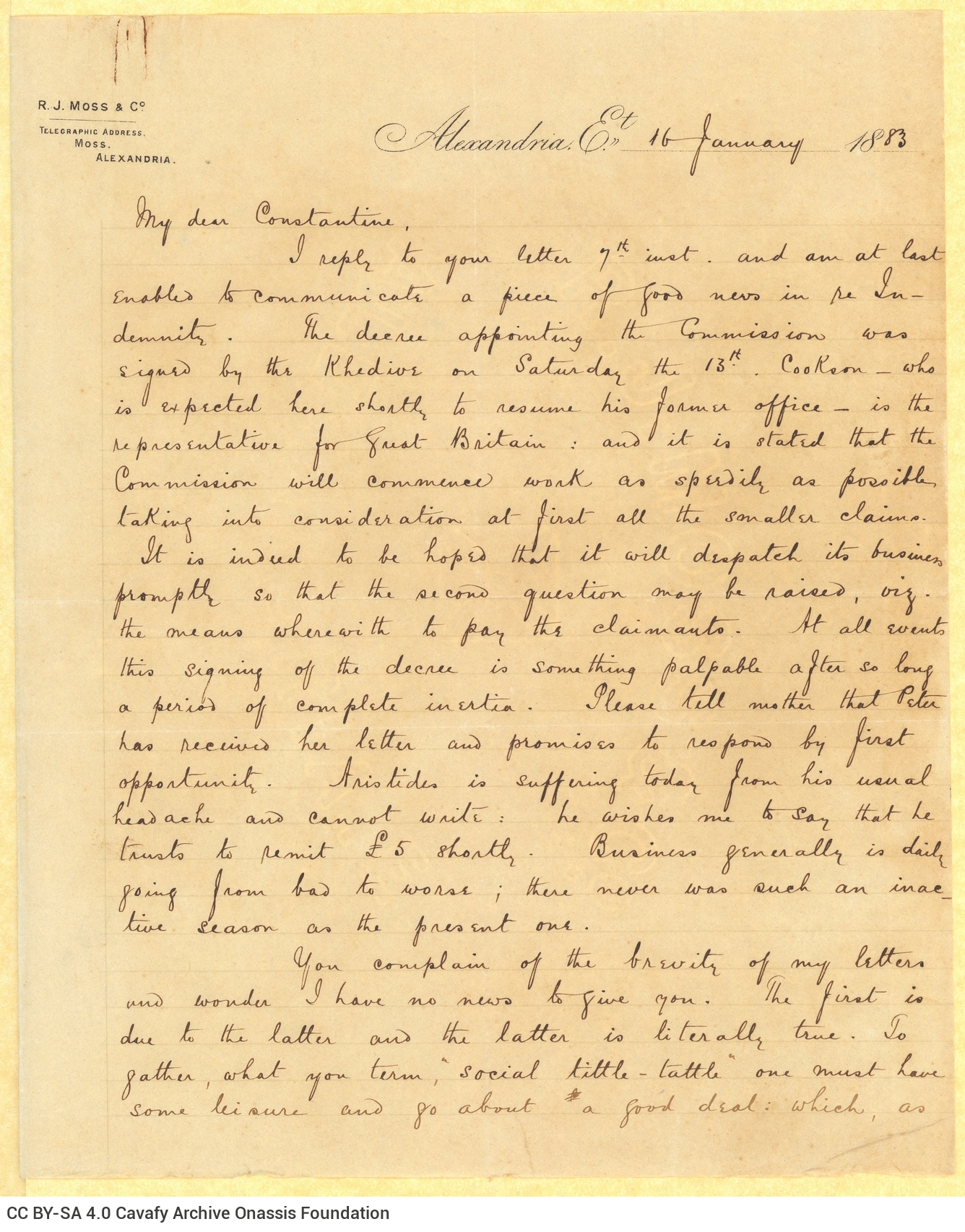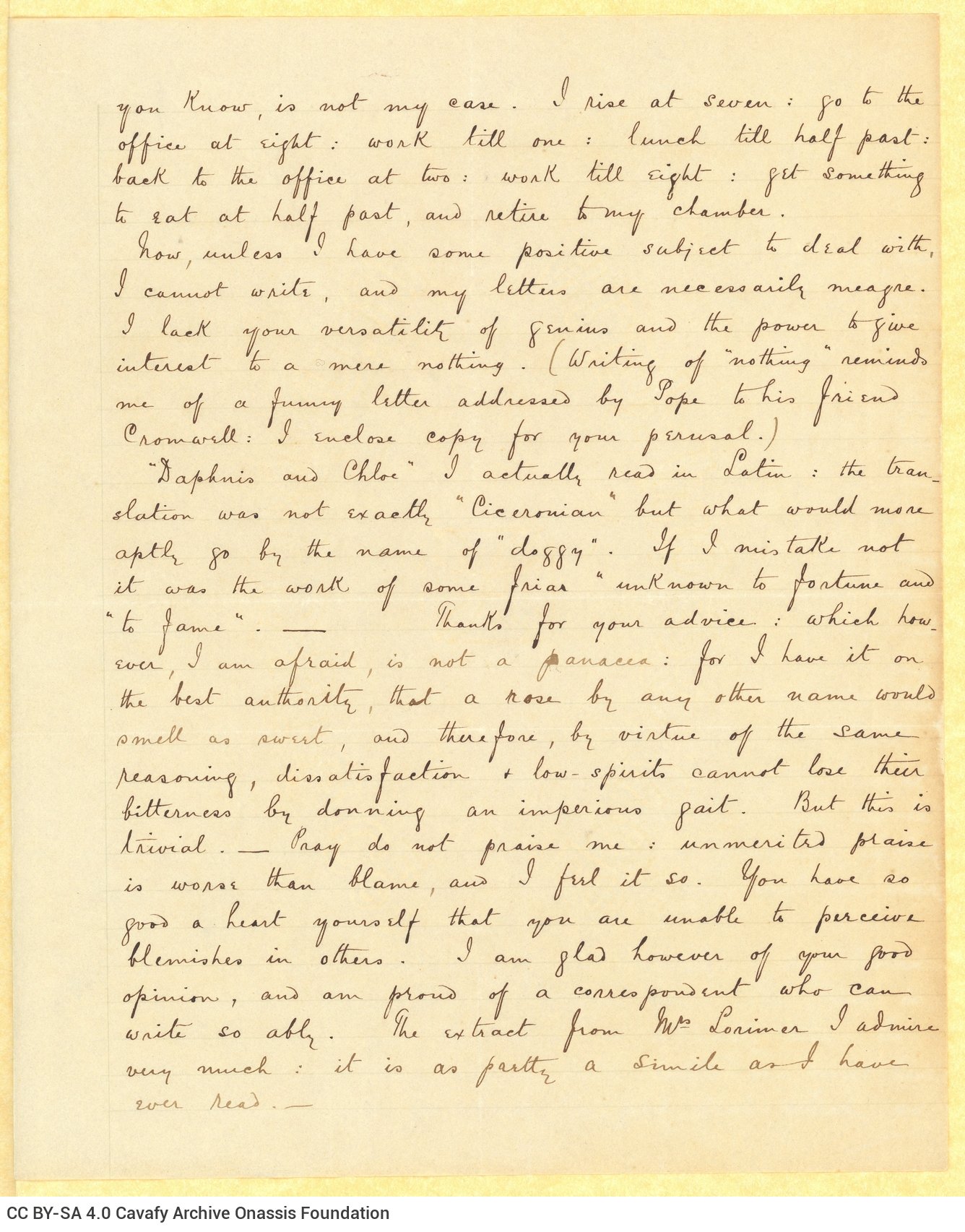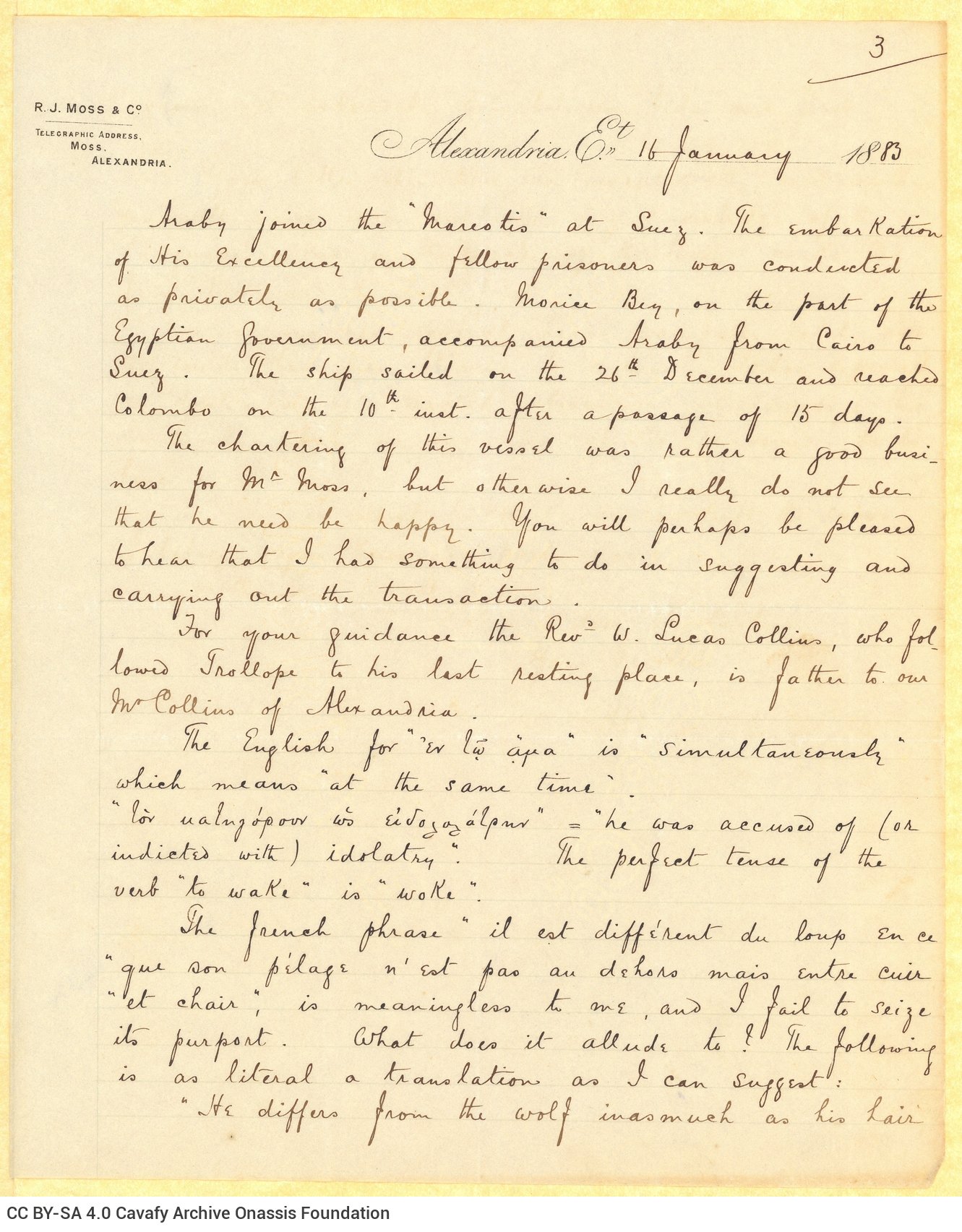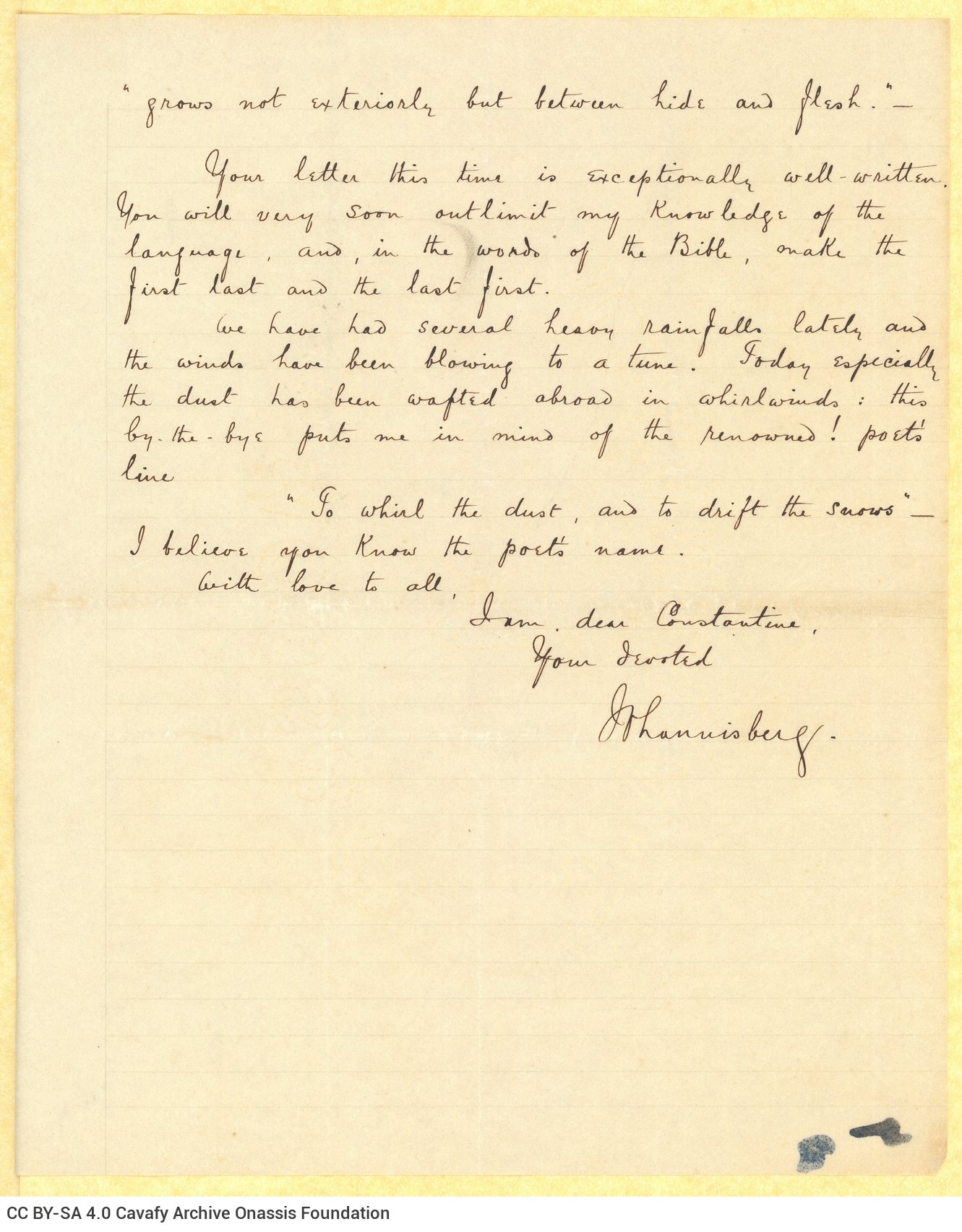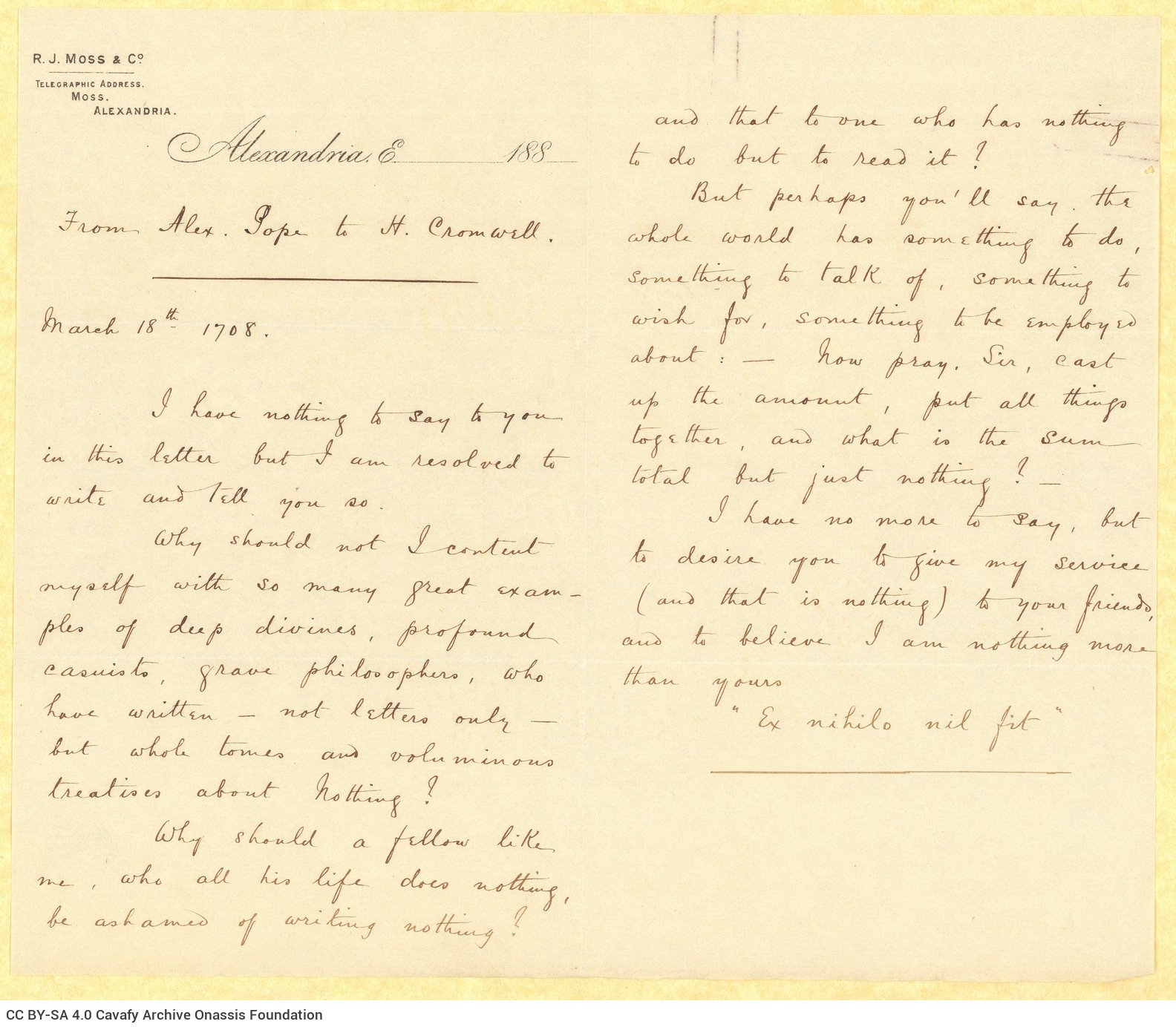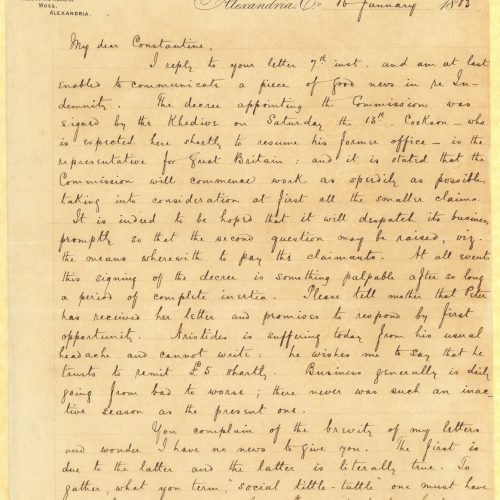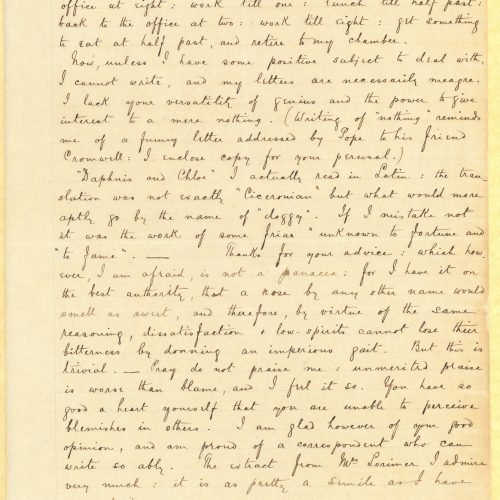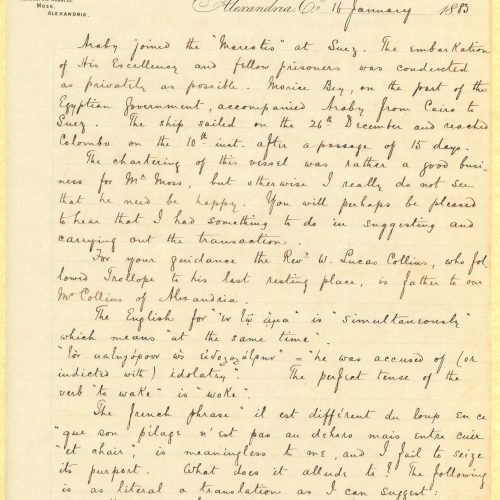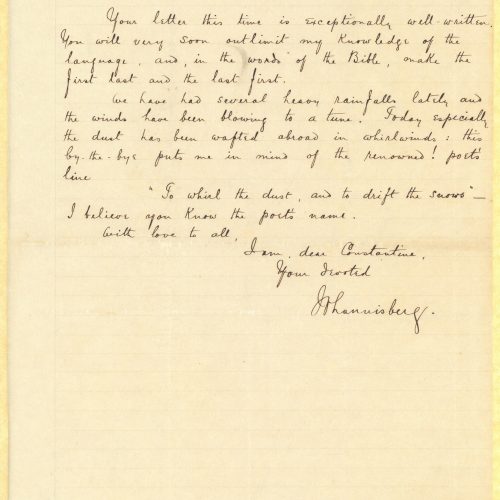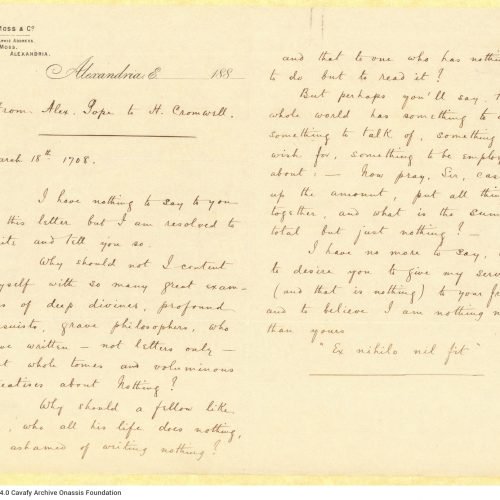Letter by John Cavafy to C. P. Cavafy
[Alexandria] 16 January 1883
My dear Constantine,
I reply to your letter 7th instant and am at last enabled to communicate a piece of good news in re. Indemnity. The decree appointing the Commission was signed by the Khedive on Saturday the 13th. Cookson ― who is expected here shortly to resume his former office ― is the representative for Great Britain: and it is stated that the Commission will commence work as speedily as possible taking into consideration at first all the smaller claims.
It is indeed to be hoped that it will despatch its business promptly so that the second question may be raised, viz. the means wherewith to pay the claimants. At all events this signing of the decree is something palpable after so long a period of complete inertia. Please tell mother that Peter has received her letter and promises to respond by first opportunity. Aristides is suffering today from his usual headache and cannot write: he wishes me to say that he trusts to remit £ 5 shortly. Business generally is daily going from bad to worse; there never was such an inactive season as the present one.
You complain of the brevity of my letters and wonder I have no news to give you. The first is due to the latter and the latter is literally true. To gather, what you term, “social tittle-tattle” one must have some leisure and go about a good deal: which, asyou know, is not my case. I rise at seven: go to the office at eight: work till one: lunch till half past: back to the office at two: work till eight: get something to eat at half past, and retire to my chamber.
Now, unless I have some positive subject to deal with, I cannot write, and my letters are necessarily meagre. I lack your versatility of genius and the power to give interest to a mere nothing. (Writing of “nothing” reminds me of a funny letter addressed by Pope to his friend Cromwell: I enclose copy for your perusal.)
Daphnis and Chloe I actually read in Latin: the translation was not exactly “Ciceronian” but what would more aptly go by the name of “doggy”. If I mistake not it was the work of some friar “unknown to fortune and to fame”. ― Thanks for your advice: which however, I am afraid, is not a panacea: for I have it on the best authority, that a nose by any other name would smell as sweet, and therefore, by virtue of the same reasoning, dissatisfaction and low-spirits cannot lose their bitterness by donning an imperious gait. But this is trivial. ― Pray do not praise me: unmerited praise is worse than blame, and I feel it so. You have so good a heart yourself that you are unable to perceive blemishes in others. I am glad however of your good opinion, and am proud of a correspondent who can write so ably. The extract from Mrs. Lorimer I admire very much: it is as pretty a simile as I have ever read. ―Araby joined the Mareotis at Suez. The embarkation of His Excellency and fellow prisoners was conducted as privately as possible. Morice Bey, on the part of the Egyptian Government, accompanied Araby from Cairo to Suez. The ship sailed on the 26th December and reached Colombo on the 10th instant after a passage of 15 days.
The chartering of this vessel was rather a good business for Mr. Moss, but otherwise I really do not see that he need be happy. You will perhaps be pleased to hear that I had something to do in suggesting and carrying out the transaction.
For your guidance the Reverend W. Lucas Collins, who followed Trollope to his last resting place, is father to our Mr. Collins of Alexandria.
The English for “εν τω άμα” is “simultaneously” which means “at the same time”.
“τον κατηγόρουν ως ειδολολάτρην” = “he was accused of (or indicted with) idolatry”. The perfect tense of the verb “to wake” is “woke”.
The french phrase “il est différent du loup en ce que son pélage n’est pas au dehors mais entre cuir et chair”, is meaningless to me, and I fail to seize its purport. What does it allude to? The following is as literal a translation as I can suggest:
“He differs from the wolf inasmuch as his hairgrows not exteriorly but between hide and flesh.” ―
Your letter this time is exceptionally well-written. You will very soon outlimit my knowledge of the language, and, in the words of the Bible, make the first last and the last first.
We have had several heavy rainfalls lately and the winds have been blowing to a tune. Today especially the dust has been wafted abroad in whirlwinds: this by-the-bye puts me in mind of the renowned! poet’s line
“To whirl the dust, and to drift the snows” ―
I believe you know the poet’s name.
With love to all,
I am, dear Constantine,
Your devoted
Johannisberg.
From Alex. Pope to H. Cromwell.
――――――――――――
March 18th 1708.
I have nothing to say to you in this letter but I am resolved to write and tell you so.
Why should not I content myself with so many great examples of deep divines, profound casuists, grave philosophers, who have written ― not letters only ― but whole tomes and voluminous treatises about Nothing?
Why should a fellow like me, who all his life does nothing, be ashamed of writing nothing? and that to one who has nothing to do but to read it?
But perhaps you’ll say the whole world has something to do, something to talk of, something to wish for, something to be employed about: ― Now pray, Sir, cast up the amount, put all things together, and what is the sum total but just nothing? ―
I have no more to say, but to desire you to give my service (and that is nothing) to your friends, and to believe I am nothing more than yours
“Ex nihilo nil fit”
――――――――
DIGITAL OBJECT DESCRIPTION
IDENTITY AREA
44 x 27.5 cm
CONTEXT AREA
CONTENT AND STRUCTURE AREA
Handwritten letter by John Cavafy to C. P. Cavafy on the first and third pages of two double sheet notepapers and on the recto of a letterhead of R. J. Moss & Co., Alexandria. Page 3 is numbered. Update on financial affairs of the family and on the issue of indemnities. Linguistic remarks. Quote from a letter by Alexander Pope to Henry Cromwell.
CONDITIONS OF ACCESS AND USE AREA
Mainly English
Writing in ink. Watermark: R. J. Moss & Co Alexandria. Physical item wear: oxidations.
NOTES AREA
The transcription and editing of the letters of John Constantine Cavafy addressed to C. P. Cavafy was first carried out by Katerina Ghika; said transcriptions were subsequently uploaded to the official website of the Cavafy Archive.
